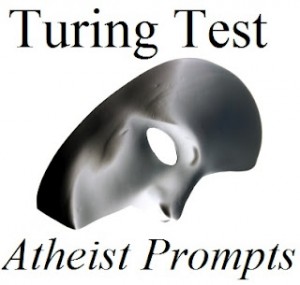This is the eighth entry in the Atheism round of the 2012 Ideological Turing Test for Religion. In this round, the honest answers of atheists are mixed in with Christians’ best efforts to talk like atheists. It’s your job to see if you can spot the difference. The voting link appears at the end of the entry, and you can look at all entries in this round here.
When (if ever) have you deferred to your philosophical or theological system over your intuitions?
Several times, with possibly the clearest example being gay rights: my intuition, when I first became aware that some people were gay, was that this was weird, and wrong, and that gay people clearly had problems if they wanted to do something so unnatural. Or in one word: squick.
On further reflection, however, I realised that:
- I had no indication that people chose to be gay (and given the treatment they often received, why would they?)
- I already knew that I wished to treat people fairly regarding characteristics they had not chosen.
- Therefore I should support equal treatment for gay people even if it made me feel personally uncomfortable, because my discomfort was hardly their responsibility.
I have since become much more comfortable with the variation in human sexuality, but I reached the point of being supportive of Civil Partnerships (as currently available in UK law) when anything other than heterosexuality seemed unnatural to me; and getting further in accepting people for who they are required personal acquaintance with out gay people, whereas the initial conflict was between my intuition and my philosophical commitment to fairness.
Are there people whose opinions on morality you trust more than your own? How do you recognize them? How is trusting them different than trusting someone’s opinion on physics?
Yes, though each source is only useful for some questions! In my moral framework consequences are important, and reaching good consequences in complex decisions can need expert advice. In the example of a proposal to support a resistance group in a foreign country, depending on the situation in that country intervention might be morally wrong, morally permissible, or morally obligatory. Deciding which is the case will require a knowledge of the current regime; the character and methods of the resistance group; their prospects for success; and so on. On all of these questions there will be people much better informed than I, and while I will try to synthesise their data and come to my own moral judgement, I know that my picture will be incomplete, and I may lean on experts’ judgement to some extent.
This is more like trusting someone’s judgement of history than trusting their judgement of physics, in that there are a lot of unreliable sources and often little hard data. One key criterion for me is transparency of reasoning – does an ‘expert’ cite sources and show how these build up to the overarching moral judgement, or do they assert?
Can you name any works of art (interpreted pretty broadly: books, music, plays, poetry, mathematical proofs, etc) which really capture the way you see life/fill you with a sense of awe and wonder? You can give a short explanation or just list a few pieces.
Iain M Banks has written a series of novels set in the Culture. It’s an anarchistic post-scarcity society, where both human and machine citizens have broad personal autonomy. I love it and I want to live there; but in lieu of that, I do use the ‘Culture perspective’ to guide me sometimes; having this almost-utopian benchmark for reference helps to avoid the Oppression Olympics. Rather than thinking “is it really a priority that some people can’t do x when children are starving around the world”, I can think “would the treatment these people receive be acceptable in the Culture?” If the answer is no, then there is a problem that needs addressing, and I should be broadly supportive of people trying to address it. I recognise that there are other ways to reach this position, but this one works for me.
As for a sense of awe and wonder, anything which shows the human and the epic scale together, especially if it shows how actions by individuals can have effects far beyond their own horizons. This can be found in real history as well as fiction, and 1688: A Global History by John E Wills is an excellent example.
Click here to judge this entry, and, once you’ve voted, feel free to speculate and trade theories in the comments or look at other entries in this round.












